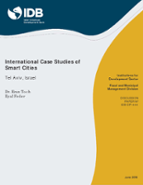International Case Studies of Smart Cities: Tel Aviv, Israel
Date issued
Jun 2016
Subject
Sustainable City;
Municipal Management;
Citizen Safety;
Urban Infrastructure;
Road Traffic Control;
Urban Transport;
Urban Innovation;
Urban Sustainability;
Citizen Participation;
Business Development;
Broadband Service
JEL code
H72 - State and Local Budget and Expenditures;
L88 - Government Policy;
L86 - Information and Internet Services • Computer Software
Country
Israel
Category
Discussion Papers
This case study is one of ten international case studies developed by the Inter-American Development Bank (IDB), in association with the Korean Research Institute for Human Settlements (KRIHS), for the cities of Anyang, Medellin, Namyangju, Orlando, Pangyo, Rio de Janeiro, Santander, Singapore, Songdo, and Tel Aviv. At the IDB, the Competitiveness and Innovation Division (CTI), the Fiscal and Municipal Management Division (FMM), and the Emerging and Sustainable Cities Initiative (ESCI) coordinated the study. This project was part of technical cooperation ME-T1254, financed by the Knowledge Partnership Korean Fund for Technology and Innovation of the Republic of Korea. At KRIHS, the National Infrastructure Research Division coordinated the project and the Global Development Partnership Center (GDPC) provided the funding. In recent years, Tel Aviv has developed a unique bottom-up approach toward its Smart City project, focusing its efforts on direct resident-oriented services rather than expensive, large-scale infrastructure. This case study explains Tel Aviv's strategy, demonstrating how a high level of smart urban services was achieved using decentralized, low-cost methods. The report provides details on the approach, such as its reliance on the local startup ecosystem, its creation of services using open municipal databanks and public-private partnerships, and its emphasis on lightweight services that interact directly with residents. The case study analyzes the strengths and weaknesses of Tel Aviv's approach, discussing the technologies, processes, and strategies that can be used to implement a cost-effective smart city initiative.



